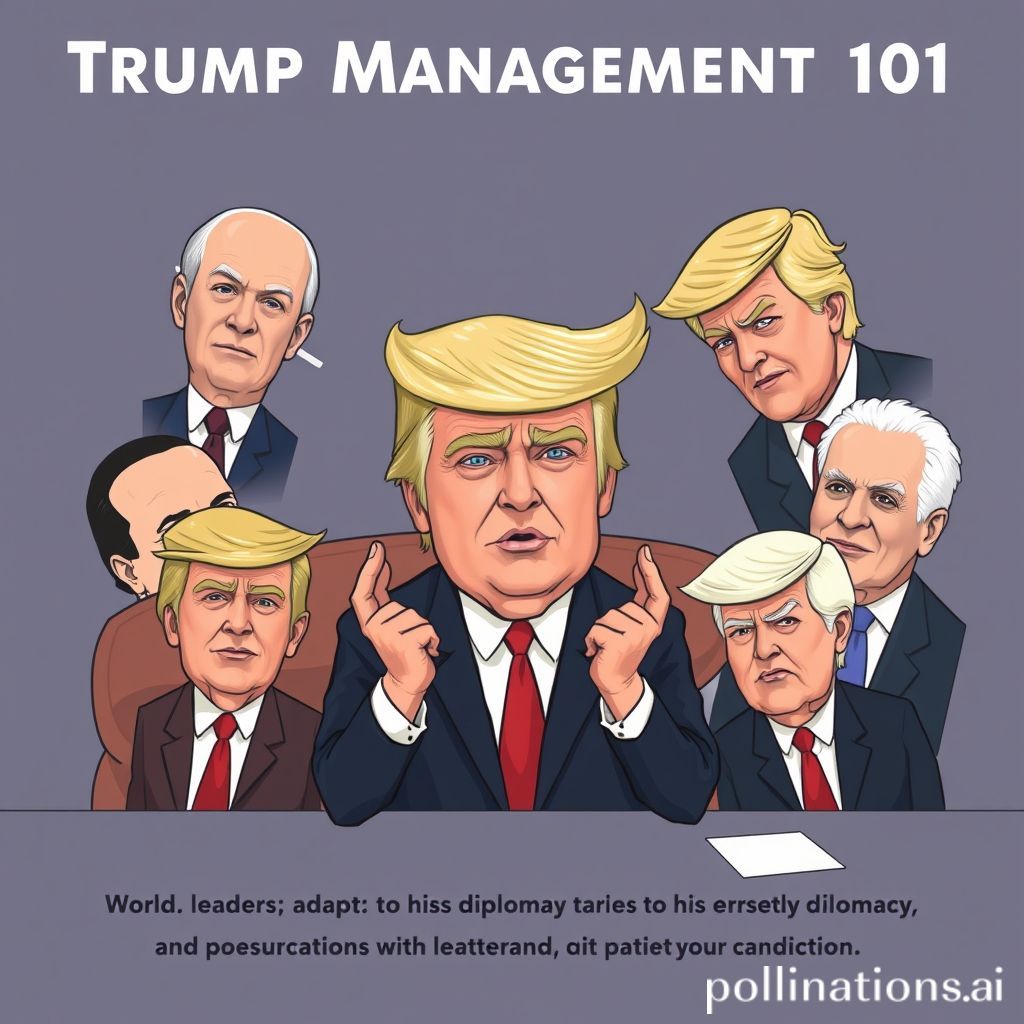Trump Management 101: World leaders adapt to his erratic diplomacy with flattery and patience

Trump Management 101: World leaders adapt to his erratic diplomacy with flattery and patience
Trump Management 101: How World Leaders Navigated Erratic Diplomacy
Navigating international relations is never a walk in the park, but the Trump era presented a unique set of challenges. Traditional diplomatic protocols often seemed to go out the window, replaced by unpredictable tweets, abrupt policy shifts, and a penchant for challenging long standing alliances. So how did world leaders cope? The answer, it turns out, involved a delicate dance of flattery, patience, and a healthy dose of strategic maneuvering.
Understanding the Trump Doctrine A Crash Course
Before diving into the strategies employed, it's important to grasp the core tenets of what could loosely be called the Trump doctrine. It was characterized by a strong emphasis on unilateralism, prioritizing American interests above all else. This manifested in trade wars, withdrawal from international agreements like the Paris Climate Accord and the Iran nuclear deal, and a general skepticism towards multilateral institutions. Personal relationships were also key. Trump often favored leaders he perceived as strong and decisive, regardless of their human rights records or democratic credentials.
The Art of Flattery Appealing to the Ego
One of the most consistent tactics employed by foreign leaders was appealing to Trump's ego. Praising his leadership, accomplishments, and even his intelligence became a common practice. This wasn't necessarily about genuine admiration but rather a calculated strategy to gain favor and influence.
Consider Japanese Prime Minister Shinzo Abe, who cultivated a close relationship with Trump through frequent meetings, golf outings, and effusive praise. This allowed Japan to maintain a strong alliance with the US and navigate potentially damaging trade disputes. Similarly, Saudi Arabia's leaders showered Trump with lavish gifts and public displays of respect, securing lucrative arms deals and maintaining close security ties.
The Virtue of Patience Waiting Out the Storm
Another crucial strategy was patience. Many leaders realized that Trump's pronouncements and policy shifts were often impulsive and not always followed through. Rather than reacting immediately and escalating tensions, they often chose to wait and see, hoping the storm would pass.
The European Union, for example, faced numerous threats of trade tariffs and accusations of unfair trade practices. Instead of engaging in direct confrontation, EU leaders adopted a more measured approach, emphasizing the importance of transatlantic relations and seeking common ground where possible. This allowed them to weather the storm and maintain a working relationship with the US, even amidst significant disagreements.
Strategic Maneuvering Adapting to the New Reality
Beyond flattery and patience, many leaders also engaged in strategic maneuvering to protect their interests. This involved diversifying alliances, strengthening regional partnerships, and hedging their bets in case the US withdrew further from the international stage.
China, for instance, seized the opportunity to expand its global influence as the US retreated from multilateral institutions. It strengthened its Belt and Road Initiative, forging closer ties with countries across Asia, Africa, and Latin America. This allowed China to position itself as a leading global power and reduce its dependence on the US.
Case Studies A Comparative Look
To illustrate these strategies, let's compare how different leaders approached their interactions with Trump:
| Leader | Strategy | Outcome |
||||
| Shinzo Abe (Japan) | Flattery, close personal relationship | Maintained strong alliance, navigated trade disputes |
| Angela Merkel (Germany) | Patience, emphasis on transatlantic values | Weathered trade threats, preserved working relationship |
| Xi Jinping (China) | Strategic maneuvering, expanded global influence | Increased global power, reduced dependence on US |
| Emmanuel Macron (France) | A mix of flattery and direct engagement | Some influence on Trump's policies, but faced challenges |
The Macron Approach A Mixed Bag
French President Emmanuel Macron attempted a different approach, combining flattery with direct engagement. He sought to build a personal rapport with Trump while also challenging him on key issues like climate change and the Iran nuclear deal. While Macron's efforts yielded some results, such as influencing Trump's decision to maintain a military presence in Syria, they ultimately proved less effective than the strategies employed by other leaders. Trump's unpredictable nature made it difficult to consistently influence his decisions, regardless of the approach.
Lessons Learned and Reflections
The Trump era offered a stark reminder that diplomacy is not a static art. It requires adaptability, strategic thinking, and a willingness to navigate complex and often unpredictable situations. While flattery and patience may seem like unsavory tactics, they proved to be effective tools for many world leaders in managing the challenges posed by the Trump administration.
Looking back, it's clear that the leaders who were most successful were those who understood Trump's personality and priorities and tailored their strategies accordingly. They recognized that traditional diplomatic approaches were not always effective and were willing to think outside the box to protect their interests and maintain stability in a rapidly changing world. It raises the question of whether such personalized diplomacy is sustainable in the long run, or if it undermines the importance of established norms and institutions. Perhaps the greatest lesson from the Trump years is the need for resilience, adaptability, and a constant reassessment of diplomatic strategies in an era of unprecedented global challenges.
Sources
Baker, Peter, and Sanger, David E. "Trump's Foreign Policy: An Autopsy." The New York Times, 2021.
Brzezinski, Ian, and Trisko Darden, Svante E. "U.S. Relations With Central and Eastern Europe During the Trump Administration." Atlantic Council, 2020.
Wright, Thomas. "All Measures Short of War: The Contest for the 21st Century and the Future of American Power." Yale University Press, 2017.
Haltzapple, John. "The Foreign Policies of Donald Trump." Brookings Institute, 2019
Comments
Post a Comment